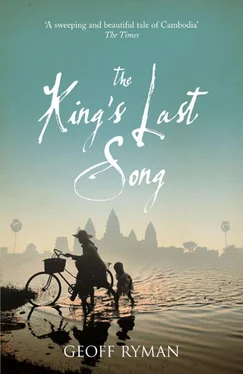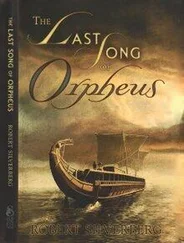‘Hey, coz,’ Rock Star murmurs.
William makes a joke and passes him his breakfast. Breakfast is a cup of boiled water. Rock Star is always smiling. He plays air guitar at parties, but he is the one family member who truly loves being a farmer. He loves his pigs. He even looks a little like them, smiling, short and bulky.
‘I’m going out towards the Phnom for feed this morning. I could go and pay the families out that way for you.’
William’s uncle and aunt are getting too old to work in the rice fields, so he pays other families a dollar a day to help with the harvest. But he must give them their money all at the same time, or there could be jealousy.
‘Cool, cousin, thanks,’ he says.
Rock Star grins sleepily. ‘I know you can’t wait to get to your foreign friends.’
Working for the UN dig team brings in seven dollars a day during tourist season. William has a contract with them; he shows up there first to drive one of them if they need him. That money pays for many things.
Outside, as tall and handsome as William, his cousin Ran goes to wash. He is so proud of his artificial leg. It is one of the best. He goes to wash at the pump wearing only a kramar round his waist so that everyone can see that he is not angry at life and very grateful to William. He waves and smiles. William sold all his ten cows to buy the leg.
William must always prove his value to the family.
Aunty comes next. Even first thing in the morning, she does not wear traditional dress. She is a modern woman, with curled hair and lipstick. She smiles at William and takes over in the kitchen. She is as kind and loving to him as if he were her son. William goes back to learning Kanji . Outside on a bamboo pole are his clean clothes for the day, washed by his cousin. In his baseball cap, trousers with big pockets and track shoes, he will look like a teenager in any suburb of the world.
My family, William thinks with fondness and gratitude. Where would I be without my family?
You would meet Map easily as well.Or rather, you would not be able to escape him.
He would scare you at first. Map is forty-four years old and smells of war. His face is scarred, and his smile looks like a brown and broken saw.
But he is wearing a spotlessly clean brown police uniform, and he seems to be patrolling Angkor Wat in some official capacity. As if in passing and wanting nothing from you, he starts explaining the pools to you in good English. The four dry basins you see so high up in Angkor Wat symbolize the four great rivers flowing from Mount Meru.
The information is of better quality than you expected. You smile, say thanks and try to edge away, dreading another request for money.
‘You’ve missed the main bas-reliefs,’ he warns, again as if in an official capacity. ‘Come this way.’ He leads you down steps, to the bas-relief gallery. The stone is polished, the detail amazing. Map explains scenes from the Mahabarat and the Ramayana. He turns a corner and explains that the roof of this gallery is how all the galleries would have looked.
You might ask him if he is a trained tourist guide. He tells you, ‘I work for Professor Luc Andrade of the United Nations dig team. I do their website.’
That throws you for a moment. Who is this guy?
He points to carved soldiers in strange uniforms. ‘These are mercenaries. Nobody trust those guys,’ he says. ‘Like me. I used to be Khmer Rouge, but I changed sides and joined Hun Sen. They made me march in front, to step on landmines.’
Then he tells you, smiling, that he guarded a Pol Pot camp. It wasn’t a camp; it was a village, in a commune; but Map knows what Westerners expect. He knows he has you hooked.
He takes you on a tour of hell, the long bas-relief of people being tortured. Map lists them all for you.
The frying pan, for people who kill embryos .
Pot baking for trusted people who steal from gurus .
Forest of palm trees for people who cut down trees unduly …
‘We need that in Cambodia now,’ he says and smiles. ‘People cut down all our forest.’
He points to someone hammering nails into people’s bones. ‘I was that guy there,’ he says.
Howling, for those who are degraded …
Today, 11 thApril, Map gets up later than William does, but then he worked all night. He’s a Patrimony Policeman, protecting Angkor from art thieves. He sleeps off and on in a hammock strung across the doorway of the main building.
Then he works all day as well, anything to add to his salary of sixteen dollars a month.
This morning, he has persuaded an adventurous barang to sleep alongside him in another hammock. The foreigner, a German, is swathed in mosquito nets and smells of something chemical. He is pink and splotchy and still has on his glasses.
Map rocks him awake. ‘Come on,’ Map says in German, ‘it is time to see the sunrise.’ The man has paid him ten dollars for the privilege but like all tourists is so scared of theft that he has hidden his tiny digital camera in his underpants. Can you imagine how it smells? Map thinks to himself. I wonder if it’s taken any pictures inside there by mistake.
The German sniffs, nods.
Map chuckles. ‘You never been in a war.’ The German looks miffed; he thinks he’s a tough guy. ‘You wake up in the morning in a war, pow! Your eyes open, wide, wide, wide, and you are looking, looking, looking.’ Map laughs uproariously at the once daily prospect of being shot.
In the early morning mist, the five towers of Angkor Wat look magnified, as if the air were a lens. Map leads the German up steps, past scaffolding to the empty pools. He considerately takes hold of his elbow to lead him up onto the next level.
Here are tall staircases to the top of the temple. They taper to give the illusion of even greater height, and they are practically vertical, more like ladders than staircases.
‘People say these steps are narrow because Cambodians have small feet.’ Map grins. ‘We’re not monkeys! We don’t like pointing our bums at people. These steps make people turn sideways.’ He shows the German how to walk safely up the steps.
Then, as a joke, Map sends him up a staircase that has worn away at the top to a rounded hump of rock with no steps or handrails.
The German finds himself hugging the stone in panic. From here, the drop looks vertical. Map roars with laughter. The German looks back at him and his eyes seem to say: this wild man wouldn’t care if I fell!
He is not wrong. There is something deranged about Map. He has been shooting people since he was twelve years old.
Map chuckles affectionately, and nips around him and up and over the stone on his thick-soled policeman’s shoes. He crouches down and pulls the German up.
‘You have a lot of fun! You don’t want to go up the staircase with a handrail.’
‘Uh,’ says the German, just grateful to be alive. He turns and looks down and decides that, after all, he has just been very brave. Adventure was what he wanted. ‘Not too many old ladies do that!’
Even at this hour, the pavilion around the main towers is full of people. Other Patrimony Policemen greet Map with a nod and a rueful smile at his tourist catch. A large image of the Buddha shelters in the main tower, robed in orange cloth. Blacktoothed nuns try to sell the German incense sticks. He buys one and uses that as an excuse to get a series of shots of an old woman with the Buddha.
Map leads the tourist through a window out onto a ledge, high up over the courtyard, which is itself above ground level. It is what, a hundred, two hundred feet down to grass?
The ledge is wide – twenty people could easily sit down on it. The German grins and holds his camera out over the edge to take a picture. Over the top of the surrounding wall, trees billow like clouds, full of the sounds of birds and smelling like medicine.
Читать дальше












